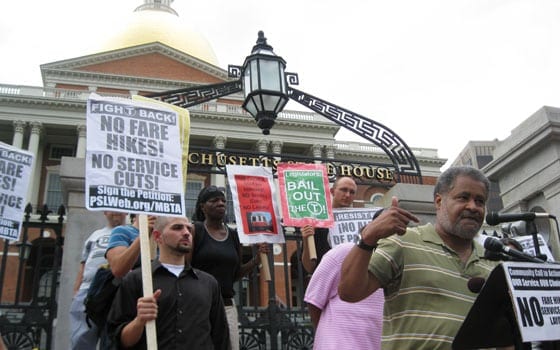
Bob Terrell (right), leader of the On the Move Coalition, speaks during a rally held Monday, Aug. 10, 2009, outside of the State House before a public workshop held by the Massachusetts Bay Transportation Authority to discuss a planned system-wide increase in mass transit fares. Fare raises, service cuts or both are expected. (Yawu Miller photo)
More than 150 transit activists gathered at the State House on Monday to protest plans forwarded by the Massachusetts Bay Transportation Authority (MBTA) for a system-wide fare hike.
While MBTA officials say they will have to raise fares, cut services or do both to cover its budget deficit, transit activists called on the state Legislature to relieve the MBTA of its $5.2 billion debt, much of which was transferred to the agency from the state’s Big Dig highway reconstruction project.
“I feel that riders need not suffer more for the T’s debt,” said Taisha O’Bryant, chairwoman of the T Riders Union, a public transit advocacy group. “The T inherited the debt from the Big Dig and I feel the state Legislature needs to step up and face this problem.”
O’Bryant spoke at a rally staged before the first of 12 public workshops the MBTA had planned to hold to encourage public discussion of its fiscal challenges. The Boston Globe reported in Wednesday’s edition that Gov. Deval Patrick canceled the remaining meetings on Tuesday, suspending such discussions until after the completion of an independent review of the MBTA’s management. The review is expected to be completed in November.
During Monday’s workshop, held in the State House’s Gardner Auditorium, legislators echoed the activists’ opposition to fare hikes and service cuts, and called for a comprehensive solution to the MBTA’s debt and fiscal crisis.
“We need to take a step back and take a creative approach,” said state Rep. Marie St. Fleur, who questioned the agency’s plan to spend $128 million on upgrades to the Mattapan bus route along Blue Hill Avenue.
“People want more and better service,” she said. “Not less service and higher costs.”
By the time of Monday’s hearing, the MBTA’s tone had changed, with Deputy Manager Jonathan Davis saying that the agency would not raise fares until the completion of a review of the agency’s finances by former John Hancock Chief Executive Officer David D’Alessandro.
While D’Alessandro’s review will likely look at inefficiencies in the agency, T Riders Union activists remain focused on the MBTA’s finances.
In 2000, the Legislature created a funding structure for the MBTA that included 20 percent of receipts from the state’s sales tax, plus assessments paid by cities and towns serviced by the transit system. Fares and other revenue generated by the MBTA account for just 48.7 percent of the agency’s revenue.
Since that funding structure was put in place, revenue from the sales tax has not kept pace with inflation. As the MBTA’s costs have continued to rise, the agency has implemented fare increases — four in the last nine years.
The MBTA’s latest call for fare increases comes on the heels of the Legislature’s appropriation of $160 million in funds meant to stave off hikes and service cuts that the MBTA had threatened earlier in the year.
The increase that had been considered by the agency would have increased fares by 19.5 percent. The cost of a subway ride for riders with CharlieCards would have increased from $1.70 to $2. The cost of a monthly pass would have risen from $59 to $69.
Speaking at the rally before the hearing, City Councilor Chuck Turner said the fare increases would affect the lowest-income commuters in the city, while higher-income commuters who drive to work have been spared a toll hike.
“The government has to protect the interests of the average and low-paid workers,” he said. “People who use public transportation shouldn’t be expected to pay the debt of people who drive to work.”
The MBTA will pay $267 million in interest on its debt this year. According to the T Riders Union, that figure is nearly four times the revenue that would be generated by a fare increase and nearly five times the estimated savings from the proposed service cuts.
Bob Terrell, who heads the On the Move Transportation Coalition, suggested the state increase the gas tax to pay the debts incurred by the Big Dig, rather than relying on MBTA riders.
“The gas tax hasn’t been raised in the last 17 years,” he said. “At a minimum, the state should raise the gas tax to reflect inflation. The idea that T riders should bear the burden is ridiculous.”
Public transit advocates argued that the fare increase would discourage riders from using the T and would disproportionately affect lower-paid workers.
“People are moving farther and farther out of the city for affordable rents,” said Pamela Bush, who moved to Hyde Park from Jamaica Plain four years ago. “Now these people are paying higher fares. Their transportation costs are hitting the roof.”
The T’s call for higher fares comes after former General Manager Daniel A. Grabauskas, who stepped down last week, went public with allegations that the Patrick administration ignored his call to delay a fare hike until 2011. According to the Boston Globe, Grabauskas asserted that the agency would have sufficient revenues to operate with fares at the current level.
Patrick administration officials say Grabauskas himself advocated for the fare hikes.







